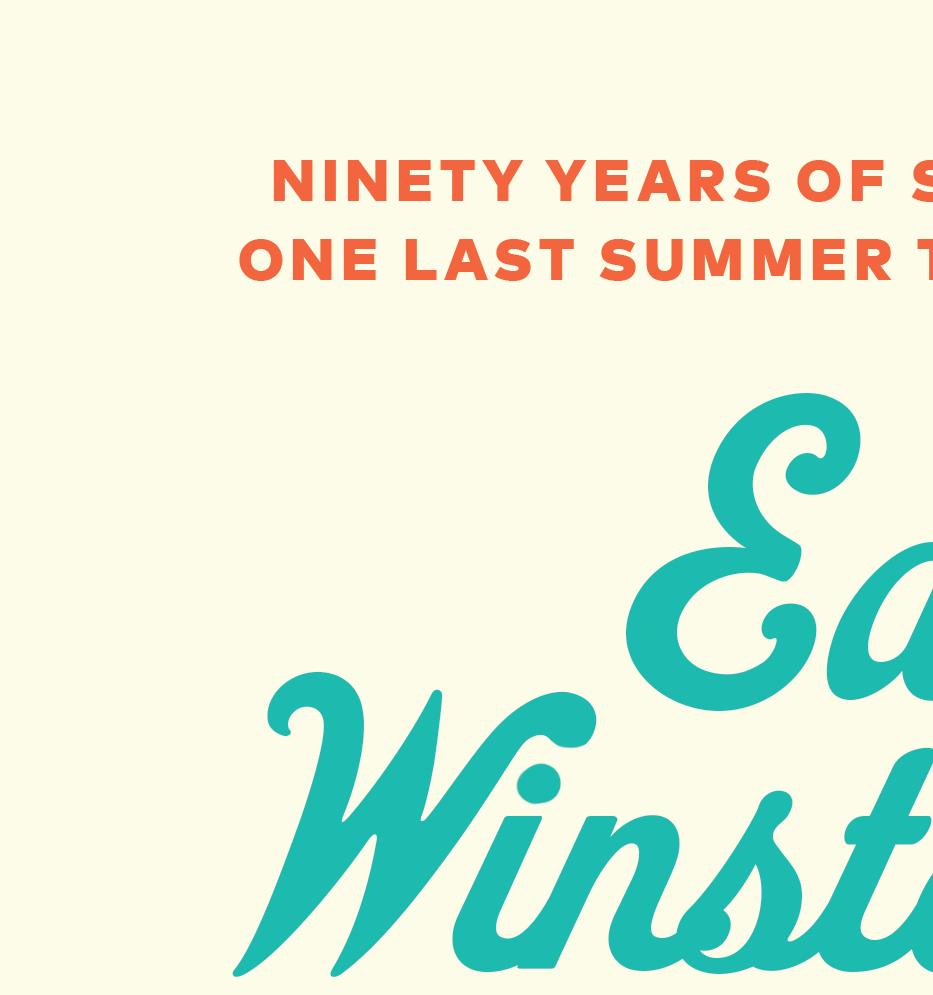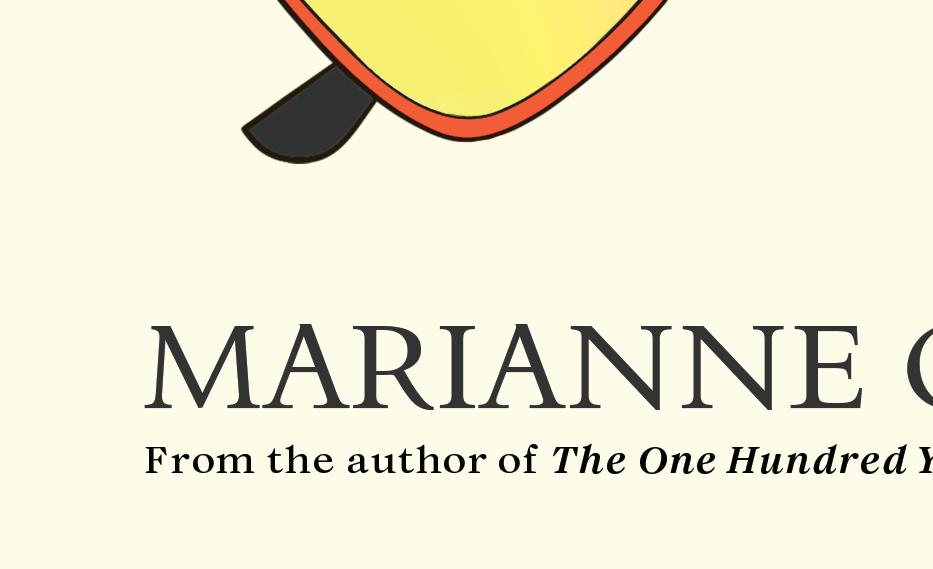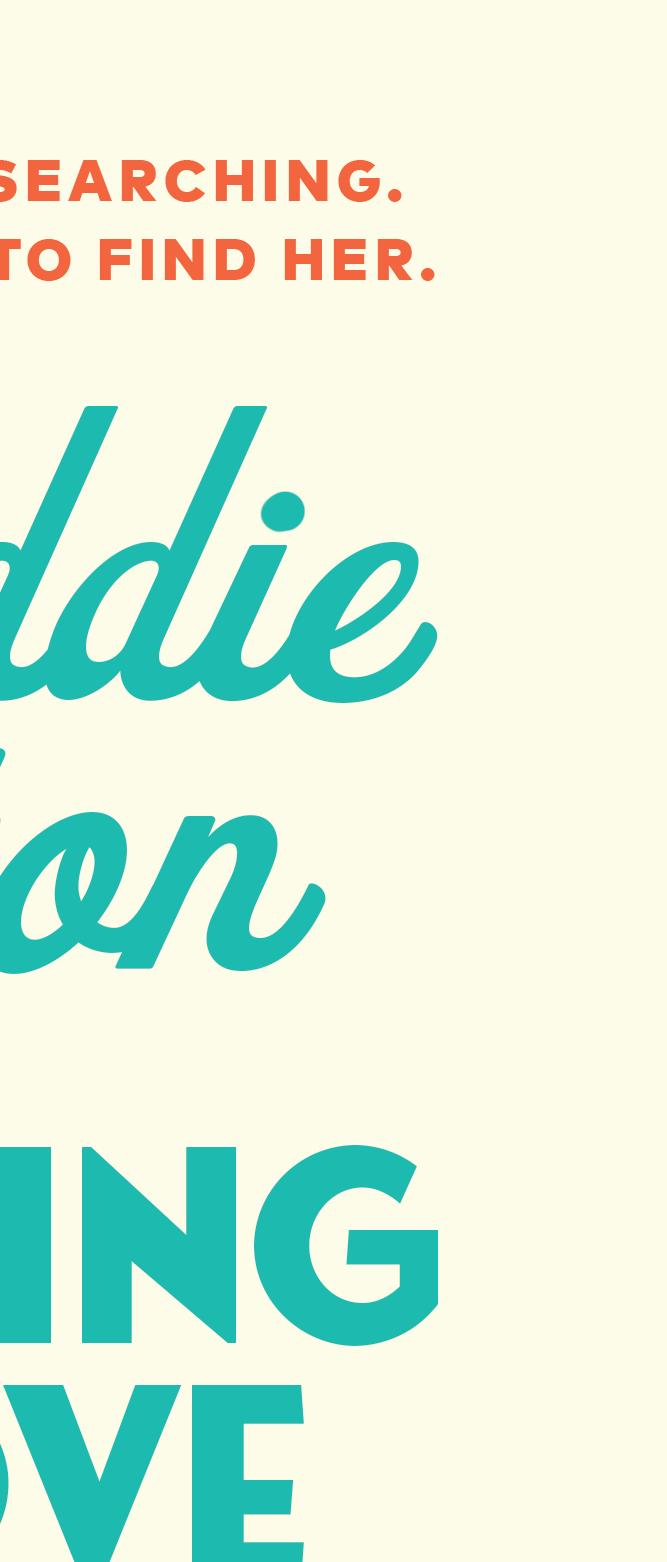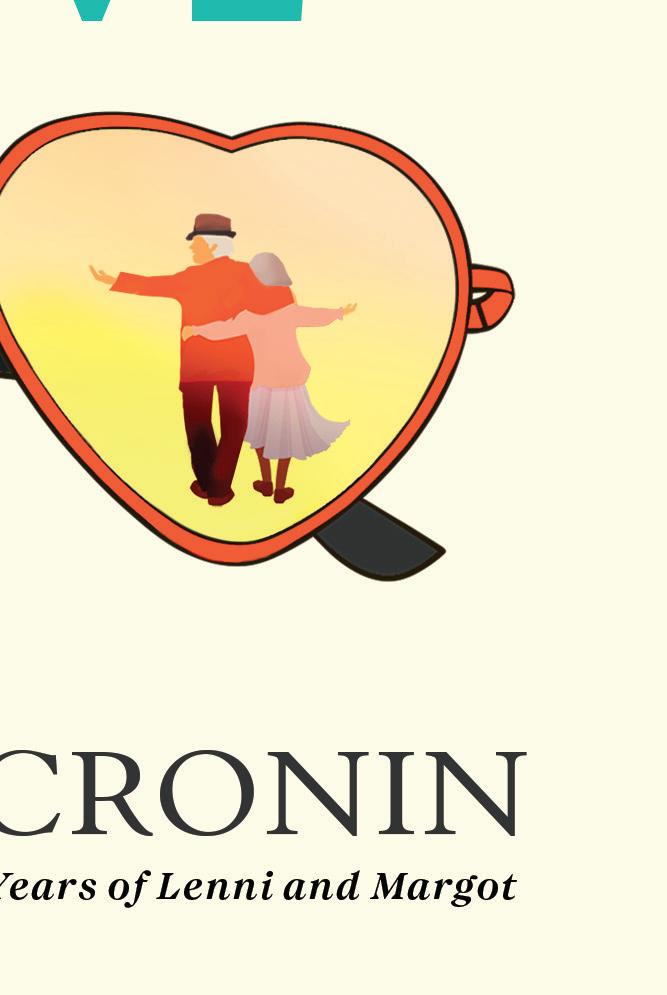





EDDIE WINSTON IS LOOKING FOR LOVE
www. penguin .co.uk
Also by Marianne Cronin







www. penguin .co.uk
Also by Marianne Cronin
Marianne Cronin
Penguin Random House, One Embassy Gardens, 8 Viaduct Gardens, London SW11 7BW www.penguin.co.uk
Transworld is part of the Penguin Random House group of companies whose addresses can be found at global.penguinrandomhouse.com

First published in Great Britain in 2024 by Doubleday an imprint of Transworld Publishers
Copyright © Marianne Cronin 2024
Marianne Cronin has asserted her right under the Copyright, Designs and Patents Act 1988 to be identified as the author of this work.
This book is a work of fiction and, except in the case of historical fact, any resemblance to actual persons, living or dead, is purely coincidental.
Every effort has been made to obtain the necessary permissions with reference to copyright material, both illustrative and quoted. We apologize for any omissions in this respect and will be pleased to make the appropriate acknowledgements in any future edition.
A CIP catalogue record for this book is available from the British Library.
ISBNs
9780857527219 (hb)
9780857527226 (tpb)
Typeset in 11/15.5 pt Sabon by Falcon Oast Graphic Art Ltd Printed and bound in Great Britain by Clays Ltd, Elcograf S.p.A.
The authorized representative in the EEA is Penguin Random House Ireland, Morrison Chambers, 32 Nassau Street, Dublin D02 YH68.
Penguin Random House is committed to a sustainable future for our business, our readers and our planet. This book is made from Forest Stewardship Council® certified paper.
for my girl
i love you to the moon, to the pink sky, to the top of the tallest clocktower and back to mama
And so, we come to the end.
The remnants of a life don’t add up to much, really. Not once the big things – the fridge freezer, the three-piece suite, the body – are all boxed up and gone.
What remain are the little things. Odd bits and pieces. Books and records and jumpers and wellies, rusted jewellery all a-tangle. Cards and letters and Snakes and Ladders games where the dice have gone missing and the snakes are shedding a skin. Pyjamas and photographs and seashells and postcards.
Life in all its mundane glory.
The trouble with all of these objects from all of these moments in all of these lives is that they arrive all at once. Packed together in a bin bag. And there is no telling if the shoe brush (£3) or the pink enamel mirror (£7.50) are pieces of historical importance, of meaning and metaphor, or if they are just bits of old junk. Things picked on whims that eventually become the bones of a house. Maybe it is in fact the game of Mouse Trap (50p, missing its boot piece) that is
Marianne Cronin
the thing that this poor deceased person treasured so dearly. And yet, here in the back room, sitting on my floor cushion because the chair hurts my knee, my hands ensconced in the gardening gloves that Marjie has made me wear since the Incident with the Human Tooth (root hanging off it, covered in crusted blood, £0), I sort through the donations made by the living and the dead and I put a price tag on the souvenirs of someone else’s life.
Mr McGlew’s life arrives in a black bin bag packed by a stranger.
The young man who works for Birmingham City Council’s house-clearing team comes in every few weeks with the belongings of those who have died alone in the council’s care. The squelchy sound of a wet piece of gum being pressed between his molars comes in with him. Today, he’s wearing a high-visibility waistcoat over a filthy grey Nike sweatshirt and a pair of joggers that are hung way too low.
When I close the Mills and Boon I’ve been reading about a rascally stable hand and the wealthy middle-aged countess who loves him, the young man jumps.
‘Jesus,’ he says, putting his hand to his chest. ‘I thought you were a mannequin.’
This is absurd for three reasons. First, there are no mannequins on earth as wrinkly as me. Second, this gentleman (though that term is a stretch) has handed me a bin liner of items scooped from a council house hundreds of times in the last few years. And third, we have just the one mannequin,
Marianne Cronin
and she stands lonely in the window in whatever terrible outfit Marjie and I have wrestled her into, hoping it is fashionable enough to entice someone inside.
‘Here.’ He hands me the black bin bag, which has ‘Mr McGlew’ written on a piece of paper sellotaped to its side.
‘Do you happen to know the first name of Mr McGlew?’ I ask, taking out a donations form.
‘William, I think it was, bud,’ he says, checking the name written on the back of his hand in black felt tip – he knew I would want to know. That’s sweet. Then he shuffles out of the shop, pulling his black jogging bottoms up over his Calven Kine boxers and inviting me to ‘Have a good one.’
The council flat that was once the home of this Mr McGlew will already be being cleaned by the housing maintenance team. It will be back on the council’s database tomorrow and someone else will be living in it by the following evening, all evidence of Mr McGlew having been wiped and dusted and vacuumed away.
‘You want a tea, Eddie?’ Marjie calls from the back room. I can hear her skirt bustling about as she fills the kettle. She’s wearing her favourite one today, made of purple and magenta scraps of fabric that are all patchworked together. I am relatively certain she makes them herself because I’ve never seen anything quite so Marjie for sale in a shop. A few months ago, Marjie cut her hair. She used to wear it in two long silver plaits that snaked all serpentlike down her back, but then she had it chopped and cropped into a pixie cut and it suits her so well. Neat, no nonsense and usually adorned with a clip to match whichever Frankensteinian skirt she is wearing. What I love about Marjie is the paradox of her – Marjie is orderly,
plain speaking, doesn’t suffer fools gladly and yet she dresses like she plays the accordion in a travelling circus.
‘No, ta,’ I reply.
Marjie has decreed that we are only allowed to shout back and forth to one another when there are no customers in the shop, which, late in the afternoon on a grey Thursday, is inevitable. As I fill in the donations form, I hear the kettle click off. Mr William McGlew, posthumous donation. Rest in peace, good sir. There will be other forms being filled in about him now. A death certificate, perhaps, an application for a cremation done as cheaply as possible on behalf of the city with a funeral-less goodbye.
Marjie rattles through the bead curtain that divides the front of the shop from the staff room (£12.50 – we took the tag off and kept it because Marjie and I enjoy rattling through beads). She walks carefully, stirring the Oxo that she always drinks in her dancing-fox mug. Her Foxo.
‘What is Oxo?’ I asked Marjie when I began working in the charity shop, shortly after my retirement began to make me feel restless. ‘I mean, I recognize the smell, but what is it really? What’s it made of?’, and she replied, as though this were a completely normal thing for a human to want to drink, ‘Concentrated beef.’
‘Well, no time like the present.’ I haul Mr McGlew’s bin bag off the counter and rattle back through the wooden beads.
‘You’re a star,’ Marjie calls, knowing that it always makes me sad when the city council is in charge of discarding someone’s final earthly possessions. Usually, a crying relative will drop them off, or at least an old friend, even a neighbour.
Marianne Cronin
When the council does it, it means the person who died was completely alone in the world.
Mr McGlew has very little that will be of use to us. Which makes me feel even sadder for him. What makes it into the ‘sell’ pile is a wooden carriage clock, a vintage radio and a cross stitch of a cobbled street.
And, for the recycling bin, is the rest of his life. Motheaten jumpers, a tea-stained Ordnance Survey map, a butter pot with buttons inside and a broken badminton racquet.
And that is it for poor Mr McGlew: everything he owned is now dispersed to be sold or burned or recycled. All, that is, except for five sun-yellowed envelopes addressed to Elsie Woods, 33 Church Lane, West Dean, Chichester, PO19 3QX. I place these precious epistles into the Eddie Pile.
I hear Marjie clip-clopping across the shop floor in her low-heeled shoes like a well-dressed horse and I quickly stuff the contents of the Eddie Pile into my blazer pocket.
‘Home time!’ she sings.
‘Mm-hm,’ I reply, trying not to move, lest she hear the tell-tale crunch of someone else’s words in my chest.
I pop on my hat and check the train times on my phone. There’s a train in eight minutes and another in thirty-eight, so I decide not to be too cruel to my knee and walk slowly down the hill towards New Street Station.
I love the bustle of New Street. All the busy people in their smart clothing with their laptops and lunch crumbs in heavy backpacks. I do get bumped into a lot, particularly by men in suits who have conducted an assessment and found themselves to be the most important creatures on the crust of the earth, but I love it nonetheless.
As I make my way to platform 10a, I feel Mr McGlew’s letters crunching away in my pocket. Bet you can’t wait to read us, they whisper with every crinkle. And they are right.
It began on my second day of volunteering at the charity shop.
His name was Michael and he had died in his sleep in a retirement home for army personnel. He had the usual things, of course – books and trinkets, knitted sleeveless sweaters and strong aftershave – but nestled between these things I found a small sliver of paper that in gorgeous lilting handwriting listed wool (cream), card for Harry, wrapping paper, flowers, black thread.
And across the top, in an entirely different hand, in boxy navy letters, were the words ‘Gwen’s Last List – March 1995’.
He held on to that list for nineteen years. What better evidence of a love that never wavered could I find? This list was worth everything to Michael. How could it now be worth nothing simply because he had died? It couldn’t be sold in the charity shop, of course, but I couldn’t bear to throw it in the recycling bin. So, Gwen’s Last List and Michael’s enduring love for her came home with me.
Next came the rusty locket. When I first chanced upon it, my heart took a little break from beating as I had been looking for one just like it for nearly half my life. Though it wasn’t the one I was seeking, the two sweethearts inside, a young woman with curled brown hair and a man in naval uniform, certainly didn’t belong in the bin. They can stay a little longer, I thought. Then came Evelyn’s bouquet, 1911, pressed and framed and tied with a pink ribbon with ‘Evie’s Wedding Flowers’ written on the back of the frame. And below that ‘Granny’s bouquet’ and below that still, ‘Greatgranny’s bouquet’. Her pink roses didn’t deserve to die just yet, so I snuck them home tucked under my jacket. They look nice propped up against the box of photographs that were left in a bag outside the charity shop door one winter in which a brother and sister named Andy and Sue cross what looks like North America sometime in the late 80s, having a whale of a time, dancing in discos and driving an open-top car, drenched in an orange sun made more orange by the Polaroid and the passing of time. The wedding certificate of Ada Akintola and Walter Smith from 1961, where the witnesses were both unrelated to the bride or groom and the ceremony was held at the registry office, couldn’t be bound for the bin and so I framed it in gold and placed it in the top corner of the dresser.
The dresser I keep my treasure in is old too. It’s from 1905, according to the inking on the inside of the right drawer. It does look a tad out of place in my modern city flat, but it comes with ghosts of hands that have touched it, of plates that have been stored in it, of bits and bobs that lived within the drawers. The woman in the Red Cross shop said it was
Marianne Cronin
one of the oldest pieces of furniture they’d ever had. And I snapped it up thinking we could be old together.
Mr McGlew’s secrets are still crackling in my blazer pocket as I ride the lift up to my flat. I love my flat. I love seeing all the young professionals with their tired eyes and their travel mugs full of coffee in the lift in the mornings and hearing their pounding bassy music on the weekends. I love how they don’t mind a more senior gentleman such as myself living among them. Or if they do mind, they keep it to themselves.
‘I’m home, Mr P.!’ I call as I pop my keys into the bowl by the door (shaped like a goose, slight scratch on the beak, £3).
He squeaks his reply. He is such a clever fellow.
The young woman arrived in the charity shop about six months ago, carrying the cage and looking like she needed a hug. Scarf half wrapped around her, cheeks chapped from the wind, dark bruise on her chin, lip split, eyes raw. ‘Can I donate this?’ she asked, placing the cage on the counter.
Outside the shop, two little boys in matching coats were waiting for her, standing beside a huge suitcase and a stack of bin bags. Each boy was wearing a superhero backpack, and they were bundled up in what looked like all the coldweather clothing they owned.
From the look in her eye as she noticed me noticing them, I sensed that I had surmised what was happening correctly.
I turned the cage around and peered in between the bars –nestled among the sawdust was a creature. He looked like a toupee come to life, with long white and orange hair flowing down his sides. I could only just make out which end was the front.
‘Hello there!’ I said to him. ‘What’s your name?’
‘Spiderman,’ she said, with evident embarrassment. ‘They named him.’ She gestured to the boys.
‘Ah.’ I looked down at the little living wig. ‘Well, hello, Mr Spiderman.’
‘Guinea pigs are supposed to live in pairs,’ she said, ‘but he’s a bit vicious, so the vet told us to keep him alone.’
‘And you’re sure you want to part with him?’
She nodded, ‘The place we’re going doesn’t allow pets, and I don’t know—’
‘It’s okay,’ I told her. ‘Leave him with me.’
‘It’s allowed?’ she asked.
‘It’s probably not,’ I whispered. ‘But if you leave before Marjie gets out of the loo, I think we’ll get away with it.’
Thank you, she mouthed, and she hurried out of the shop. I watched through the window as she and the little boys gathered up their suitcase and bin bags as best they could and hurried off towards the train station and, I hoped, a better life.
Marjie came out of the loo, cistern hissing, picked up her half-drunk Foxo from the till and stopped dead.
‘What the hell is that?’
Sitting on the dining table in my open-plan living room, the guinea pig I rechristened Pushkin Spiderman Winston squeaks with the happiness of a guinea pig who loves his human and is pleased to see him return from work, or an animal who associates the opening of the door with his food bowl being refilled (who can say?). He scurries over to his bowl in anticipation of the bounty of crunchy veg I am about to provide.
Marianne Cronin
I attempt to ruffle his fluff through the bars. ‘Good afternoon, Pushkin.’ He whips around to nip my fingertip, but I’m far too quick for him. ‘These sausages are mine, old boy,’ I remind him.
Once his bowl is fi lled with cucumber sticks and he’s munching away with a thousand tiny nibbles and not a hint of an apology, I take off my jacket, descend into my comfiest armchair and place my latest treasure across my lap. Mr McGlew’s letters. All addressed, and yet not one of them bears a stamp, which means none of these words ever made it to Elsie. From the first envelope, I unfold a delicate piece of unlined paper. It is skin-thin. In the top corner is the date: 8 February 1971. And in slanted inky writing are the words: All of the best moments of my life involved you. I miss you, Else.
On 29 May 1974, he wrote: I still have your white gloves. I can’t bear to throw them away.
In October of that same year, he wrote: I will wait for you, Elsie.
On 8 February 1975, he wrote:
Do you remember the first time you kissed me? On the pier while your mother was at church? I knew then that I would never love another.
And in the last envelope, from 1981, his final words to Elsie: Even if you never speak to me again, I will die happy, thinking of that kiss.
I hope he did die happy, thinking of her, of their lips meeting for one perfect moment.
I wonder what I shall think of when I go.
I’m collecting my post from the basement. I don’t do this often because I’m forever losing the little key. But here I am and, what do you know? Beneath the bank statements and local election paraphernalia in my post box is a piece of junk mail for Thitima from number 515. Apparently, she is entitled to 20 per cent off her next pizza so long as she orders a medium with no extra toppings on a Tuesday in May between three thirty and four o’clock. I am almost at the point of letting the flyer drop into her post box when I realize that an opportunity for mischief has presented itself. And mischief is not to be ignored.
You see, it is not uncommon for me to find myself in the lift with the young folk of the building, and I have spotted, more than once, the way that Daniel from 518 looks at Thitima from 515. The way he holds his breath when she gets into the lift as though he might accidentally say something about his love out loud. He told me a few months ago that he’s homesick. I’m relatively certain the young ones think of me as the grandfather of the lift. Perhaps they think
Marianne Cronin
I’m haunting it. But either way, they tell me things. So I know that Daniel is in the third year of his post-doc in engineering and Thitima is in the fourth and unfunded year of her doctorate in English.
Given how much I enjoyed her recommendation of Gilmore Girls, I know that Thitima can be trusted. Given that she said she watches it every day, I know she’s lonely.
The fl yer is shiny between my fi ngers, and the gooey, cheesy pizza slices on it do look tempting. Go for it, Eddie, the flyer says to me. Maybe they can share a slice.
I’m smiling about it all morning, thinking about Daniel standing at Thitima’s door, checking and rechecking his hair, hoping and not hoping that she will open the door . . . her smile when she sees that it’s him. And all it took was a misdelivered pizza coupon and a little chicanery from an old elevator gremlin to make that happen.
‘No guinea pigs,’ Marjie says to me with a pointed finger as she pulls on her cardigan, leaving me in charge of the shop while she goes in search of something for lunch less disappointing than the Marmite-and-cheese sandwich she brought from home. It had a big blob of green mould along the crust. ‘Ugh, bread,’ she said to me as she threw the sandwich in the bin. ‘I never feel more alone than when I’m confronted with the fact that I can’t get through a loaf of bread before it goes mouldy. If my sons still lived with me, it would be gone in a day. They eat like horses.’
‘Do horses enjoy bread?’ I asked, but Marjie didn’t know.
I imagine Marjie will go to McDonald’s. She likes McDonald’s, but for some reason is rather embarrassed about it. Throws away the wrappers in the bin outside the
shop before she comes in and then pretends she went to Greggs. I bet she orders something beefy at McDonald’s, like a burger with extra beef dripping. (I’ve never been, but I imagine that’s the kind of thing they serve.)
Just after she leaves, a man comes in, browses the hats, tries one on, looks at himself in our wall of mirrors for sale, takes a photo of himself in the hat, puts the hat back on the shelf and then leaves.
And then nothing. Nothing for so long that I pick up Marjie’s Good Housekeeping magazine and flick through to the March styles to put a spring in your step. There’s a jumper I think I might look quite good in. It’s a pastel-blue fluffy number from Dorothy Perkins for the wholly unreasonable price of £59. I think it would bring out my eyes.
I don’t notice her standing there until I hear her sniff. I lower the magazine to see a young woman with candyfloss-pink hair, dressed all in black and holding a huge cardboard box.
‘Here, please, let me help.’ I move the magazine and my cold cup of tea out of the way and I help her lift the box up on to the counter. It’s such a big box that I can’t see her now.
‘I’d like to donate these,’ she says from behind the box. Her voice is a lot softer than I expected it to be.
‘Thank you very much for the donation.’ I take a donations card from the stack under the counter. ‘May I ask the name of the person donating?’
‘Um, it’s on behalf of . . . You can just put “Jake”.’ Her voice cracks when she says his name.
I write ‘Jake’ on the donations card.
‘And what’s in the box?’ I ask. ‘Just a general category
Marianne Cronin
helps, for example, toys, shoes, homewares, et cetera.’
‘It’s, um, it’s mostly clothes,’ she says, her voice giving way at the end and making it sound like a question. I lean around the box and look at her properly. Her eyes are red raw, but she isn’t crying. She looks small. And scared.
And so incredibly sad.
‘Are you okay?’ I ask.
She nods, even though she is very clearly not okay. ‘He,’ she says, ‘he doesn’t need them any more, so . . .’
I come around the counter and, without thinking, I open my arms. For a moment, I regret it and fear she’s going to think I’m some sort of deplorable. But she steps into my hug. I offer her some tea. I offer her some Foxo. But she doesn’t stay.
Sometimes, they come back.
‘Did you sell that Pink Panther jumper yet? My mother knitted it by hand.’
‘Has the gold clock gone? I hated the thing, but it reminded me of Grandad.’
‘I donated an emerald ring. Is it still here?’
Once in a while, the item will be on the Eddie Shelf, and I tell them we will search the back room after closing so that I can scuttle home and bring it back and then ‘find’ it in our non-existent storeroom. Sometimes they are so relieved that they make a big donation to say thank you. If the item has already been sold or sent to the tip, I fumble for the words. I offer them tea. But they rarely take it.
The girl with the pink hair didn’t stay, and I have a heavy sense of dread as I heave the box she donated on to the floor of the back room.
Among the neatly folded T-shirts with what seem to be skateboarding brands printed on them I find a notebook. It is full of scribbly drawings of the girl with the pink hair, from the
Marianne Cronin
side, laughing, asleep. All in scritchy-scratchy black biro and with a liveliness to them. There are also song lyrics and poetry, but I don’t stop to read, I just enjoy turning the pages and the crinkle they make from being so laden down with black ink.
I’m closing the notebook when out slips a collection of glossy photographs.
Everything about the girl with the pink hair changes from photo to photo. Her hair colour, her make-up, her clothes. But in every picture the young man beside her is the same –tall, slim, dark-haired and wearing some combination of T-shirt and jeans and a pair of white Converse trainers that appear to be covered in writing. It seems he never took those shoes off.
Yet at the bottom of the box, here they are, worn to the shape of his feet and absolutely covered in love. And no longer needed.
On the right trainer is a drawing of the two of them which is quite good considering it’s on a shoe. ‘I love you’ loops around the laces beside a date – 12.12.18 – and across the back of the heels in black writing that has been gone over and over are the words ‘Bella and Jake Forever’.
I will keep them safe, until she’s ready to come back.
Mr McGlew is whispering and it’s keeping me awake.
I will die happy thinking of that kiss, he whispers from the shelf where he sits, in paper-and-ink form, his self-penned epitaph.
That kiss, that kiss, that kiss.
He is not Resting in as much Peace as he should be.
I wonder about his kiss with Elsie. On a pier, he said it was in his letter. I imagine their hair whipping around in the cold seaside wind as they found themselves closer than they had been before. Her neat Sunday gloves as he took her by the hand. What words must they have spoken to one another when it became clear that they were about to kiss? Perhaps it was his first kiss and he was a nervous teenager, sweaty palms resting on the small of her back, having no idea if he had done it correctly. Perhaps it was the best kiss either of them had ever experienced and they pulled apart different people.
I turn over and pull the quilt up over my ears to try to quieten him.
I will wait for you, Elsie, he whispers. I will wait.
Marianne Cronin
What happened to William and Elsie that they could not recover, and why couldn’t he find it within himself to feed his words into the grinning open mouth of a post box?
I peel off my warm covers, pad into the living room and turn on the lamp. It is far too late or far too early for the Big Light. Pushkin is sleeping with his paws out in front of his face, fluff rising and falling with every quick breath. He’s probably never had to worry about such a thing as love, has never had his little heart broken. If his disdain for all humans is anything to go by, I doubt he misses the small boys who named him Spiderman. He isn’t really a people person or a pig’s pig. It must be nice not to have to worry about being alone.
I take Mr McGlew’s envelopes from the Eddie Shelf and spread them across the dining table. What would he make of a stranger reading the words he meant only for Elsie all these years after he wrote them. Whatever his opinions, Mr McGlew has fallen quiet.
I open the first of the envelopes and re-read his words. Then the second, then the third. Only, this time, I notice that the envelope of the last letter he wrote contains something else. A strip of paper, no bigger than a receipt, and on the back in pencil he has written:
somewhere, out there, grows the tree that will be the tree that will make your coffin. you must hope it is small only a seedling, only sap but it might be tall by now
stretching its branches like arms into the sky. if I knew where it was, I would chop it down. I would return to the forest again and again with my axe, never resting, so that you might live for ever.
It is four by the time I have finished re-reading it, and there is a pink tinge to the sky. The promise of morning. I will not sleep now. Carefully, like the curator I like to imagine myself to be, I return the letters to the warm embrace of their envelopes and place them back on the Eddie Shelf. He really loved her.
I sit and listen to the tick of the clock. Oh, how he loved her.
And, I decide, she deserves to know.
I retrieve my spiral-bound notepad and attempt to pull out a few sheets. They rip right in half. More carefully this time, I try again, and I find a pen.
I try to picture Elsie, a woman in her seventies now. She was beautiful then. She is beautiful now. But diluted, her hair wispy and white, blue eyes diluted to squash. Old. Just like myself. Just like everyone eventually becomes, if they’re very lucky. I picture her sitting in a faded pink wingback armchair, hair neatly curled, eyes on mine, head tilted to one side, listening.
Elsie, I’m a pirate A thief
Marianne Cronin
A crustacean collecting pieces of seabed detritus to stick on my shell.
Except what I collect isn’t debris, it is precious. Unfortunately, the value of the item exists only as long as the person who values it lives on.
And you see, Elsie, I have come across something that belongs to you. That is meant for you, or that was.
Perhaps you would like it back?
It consists of five letters written but never sent by a Mr William McGlew.
The letters were donated to the charity shop in which I work, because (and I do hope I am not the first to share this sad news), unfortunately, Mr McGlew is no longer with us.
Please write to me at the address below and I will gladly return his words to where they belong.
Sincerely,
Eddie Winston, Donations assistant
The Heart Trust Charity Shop, 24 Corporation Street, Birmingham, B2 4LP
I copy her address from the envelopes. And this letter does make it into the eager open mouth of Her Majesty’s post box. Landing with a faint flap upon all the other words bound for better places.
I hope it’s not too late.
I’m lining up dead men’s shoes on a rack.
How strange that for all their lives, the men who wore these shoes walked a path that would lead to me. At any point, through their childhood or in their teenage years, we were destined to be linked. The intersection of our timelines was always to cross here, with me kneeling on a cushion in front of the men’s shoe shelf, sorting their brown brogues and scuffed trainers, hoping that these shoes, now useless for their dead feet, might be of interest to someone still living.
Jake’s shoes are not here, of course. They’re on my Eddie Shelf in a box to keep the dust away. Alongside Mr McGlew’s love letters and his poem, which I can’t quite get out of my head.
Marjie rattles through the bead curtain, crunching on some pork scratchings.
She holds out the packet to me and I shake my head.
‘Would you mind popping those orange bags in the window?’ she asks through a mouthful of scratching.
‘Certainly can, dear.’ I rise, my knee crunching as I go.
The shop window is our constant source of exasperation.
Marianne Cronin
We have no idea what will entice young, stylish people in to browse, so Marjie likes to select a colour to guide us. This week, the mannequin is dressed in various shades of orange. It doesn’t look terrible. But it doesn’t look good. As I stack up some orange bags ready to place beside our poor neon mannequin, Marjie flicks on the radio from Mr McGlew’s donation and a Latin dance song crackles out, as though we have our own samba band with us on the shop floor.
‘Ooh,’ Marjie says, bopping to the music and popping another pork scratching in her mouth. I join in with what I imagine is a salsa step. Taka taka taka, I dance towards the window, and Marjie twirls, her purple hippy skirt flaring out around her calves. She puts down her scratchings and holds out her hand towards me. I spin her around as the music gains some drums and shakers. The energy of the song rises and Marjie spins me around too, and we are just doing a little two-step when the song stops, rather abruptly. At the very same moment, I spot a face at the shop door. The girl with the pink hair has been watching us dance with an expression I can’t quite place. How odd – I was just thinking about destiny and shoes and there she is.
When our eyes meet, the girl with the pink hair turns and hurries off down Corporation Street.
Marjie, still a sway in her step, heads back behind the counter and resumes her crunching. If she noticed the girl with the pink hair, she doesn’t say.
‘I’m just going to pop out for a minute,’ I tell Marjie, pulling on my hat. I never just pop out. I usually wait for her to tell me when I can take my break. That’s just what good employees do.
‘Lunch?’ she asks.
‘Er, yes, I’m in search of lunch,’ I tell her, and off I go. I reach the crossing where New Street intersects with Corporation Street, the people flowing all around me, and look left and right, desperate to see a fl ash of pink. The shrill alarm of a tram goes off and I realize I’m standing in the road. I step on to the pavement and, as the tram sails by, I ask a few passers-by if they have seen a young lady with pink hair, but they look at me oddly and walk on. Despite my hat, the sun is bright and glaring in my eyes. I put my hand up to shield my face. She might have run down to New Street station, might already be heading to a platform now, getting on to a train. She might have followed Needless Alley up towards the cathedral and Pigeon Park and onwards to the Jewellery Quarter. She could be anywhere, but I have to tell her! I have to tell her that I saved Jake’s things – his crinkly notebook and the photographs and the white shoes that are covered in love.
But she’s gone.
I’m sitting on the floor cushion, organizing the bookshelf. Yesterday we received fifty-two Mills and Boon books posthumously donated on behalf of a Mrs Hill. As I shelve them, I wonder if Mrs Hill was embarrassed about owning these books – perhaps her family members found them stashed under her bed after she died. Or perhaps they were on display in a nice cabinet in the dining room for all her family and friends to see as they supped their tomato soup from the sides of spoons, the blue spines barely containing the big-bosomed duchesses and handsome dukes within.
All done, I dust my hands together and begin to think about the multi-stage process of getting up from the floor.
As I’m halfway up, I put my hands on the windowsill and spot her outside. Beaking at a piece of loose paint. She raises her head. Eyes sharp and clever. Staring into mine. An almost imperceptible wink.
‘Hello,’ I whisper. ‘So, you’re a blackbird today, are you?’